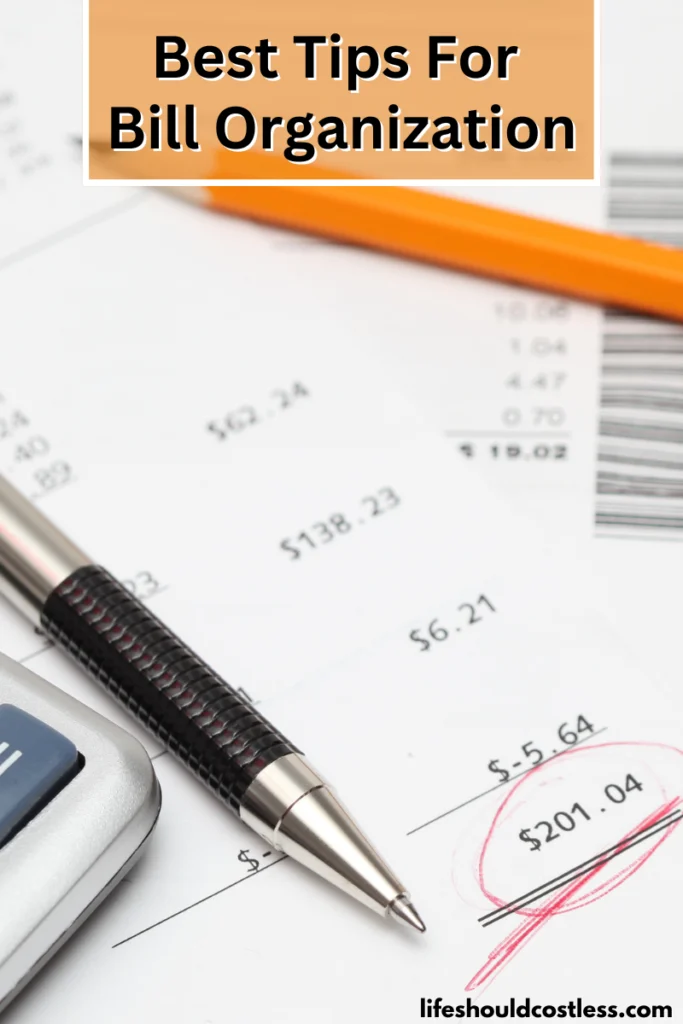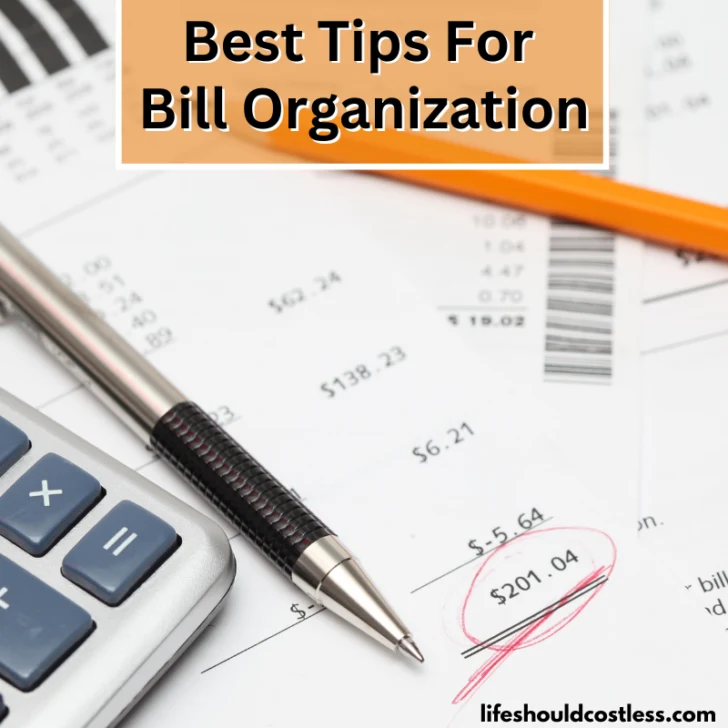Keeping track of bills and managing finances can sometimes be a struggle, especially when juggling multiple payments each month. However, with effective organization strategies you can streamline the process and manage your money with ease. In this article, we will explore the best tips for bill organization, and provide you with practical ideas and tricks to help you stay organized and on top of your money management.

Before we dive into the nitty gritty of how to organize bills I thought it might be helpful to share with you a few reasons why you should even worry about doing so in the first place.
Importance of organizing monthly bills
Learning to organize monthly bills is important for several reasons, including:
- Staying on top of expenses: Organizing bills can help you keep track of your expenses and create a realistic budget, which can help you manage your finances more effectively.
- Reducing stress: When bills are disorganized, it can create stress and anxiety, as you worry about missing payments and dealing with the consequences.
- Saving time: With bills organized and payments scheduled, you can save time by avoiding the need to search for bills, write checks, or make last-minute payments.
Avoiding late fees and penalties: When bills are not organized and paid on time, you risk incurring late fees and penalties, which can add up quickly and hurt your finances.
Maintaining good credit: Late payments can also negatively impact your credit score, which can make it harder to obtain loans, credit, and other financial services in the future.
Overall, organizing your bills and paying them on time, is an essential part of maintaining good monetary health and achieving your financial goals…
And it just plain will give you more options later in life if you learn how to manage what money you do have.
How to keep track of bills and payments
There are several smart and effective ways to keep track of bills and payments, including:
- Creating a bill payment schedule: Creating a schedule that lists all your bills, their due dates, and the amount owed can help you stay on top of your payments. You can use a spreadsheet or a notebook to create this list, and set reminders for yourself to ensure you pay bills on time.
- Going paperless: Many companies now offer paperless billing options, which allow you to receive bills and statements via email instead of traditional mail. Going paperless can help you easily access your bills online, reduce clutter in your home, and reduce the risk of losing or misplacing bills and statements.
- Setting up automatic payments: Many banks and credit card companies offer automatic payments, which can be a useful tool to ensure you never miss a payment. With automatic payments, the bill amount is automatically deducted from your account on the due date.
- Using a bill tracking app or software: There are many apps and software programs available that can help you track your bills and payments. These tools can send you reminders and alerts, and some can even automate bill payments for you.
- Enlisting the help of a bill paying service: If you find it difficult to stay on top of your bills, you may consider using a bill paying service. These services can help you manage your bills, pay them on time, and provide you with regular updates on your account activity.
Ultimately, the best way to keep track of your bills and payments will depend on your personal preferences and needs. It may be helpful to try out different methods to see what works best for your families financial situation.
How to create a bill payment schedule
Creating a payment schedule for bills can help you stay organized and on top of your payments.
Here are some steps you can take to create a bill payment schedule:
- List out your bills: Start by making a list of all your bills, including credit card payments, utility bills, rent or mortgage payments, and loan payments. Write down the name of the company, the due date, and the amount owed for each bill.
- Determine payment amounts: Next, determine the payment amount for each bill. This may be a fixed amount, such as rent or mortgage payments, or a variable amount, such as credit card payments.
- Decide on payment methods: Consider the payment methods available to you, such as online payments, mail-in payments, or automatic payments. Some bills, such as rent or mortgage payments, may require a check or money order.
- Choose a payment date: Choose a payment date for each bill that is convenient for you and fits with your budget. For example, if you get paid twice a month, you may want to schedule some bills for the beginning of the month and others for the middle of the month.
- Set reminders: Set reminders for yourself to ensure you don’t miss any payments. You can use a calendar or reminder app on your phone, or set up automatic reminders with your bank or credit card company.
- Monitor your bills: Monitor your bills each month to ensure that you’re paying the correct amount and that there are no errors. If you notice any discrepancies, contact the company to resolve the issue.
Be sure to review your schedule regularly, such as every few months (quarterly), and make adjustments as needed to ensure that it continues to work for you.
How to consolidate monthly bills
Sometimes you may feel like you’re drowning in a sea of never-ending bills that need to be paid… if that is the case for you, you may want to consider some debt consolidation.
Consolidating bills involves combining multiple bills into one, making it easier to keep track of payments and reducing the number of bills you receive each month.
Here are some steps you can take to consolidate your bills/debts:
- Gather your bills: Start by collecting all your bills, including credit card statements, utility bills, and loan statements. Make a list of each bill, including the due date and the amount owed.
- Research consolidation options: Once you have a list of bills, research consolidation options that are available to you. For example, you may be able to consolidate your credit card debts into one payment, or combine your utility bills into a single bill. Some phone and internet providers also offer bundled services at a reduced rate.
- Compare options: Before consolidating bills, it’s important to compare prices and read the terms and conditions. Make sure you’re not paying more for services you don’t need or use. Look for any hidden fees or charges, and make sure you understand the terms of the consolidation agreement.
- Apply for consolidation: Once you’ve found a consolidation option that works for you, apply for consolidation. This may involve filling out an application or contacting the company directly. Some companies may require a credit check or other information before approving your application.
- Set up payments: Once your bills are consolidated, set up payments to ensure you pay on time each month. You may be able to set up automatic payments or use a bill paying service to make payments easier.
Consolidating bills can help simplify your financial life, reduce the number of bills you receive each month, and potentially save you money. However, it’s important to carefully consider your options and choose a consolidation plan that works best for your needs and long term financial goals.
Conclusion
In conclusion, staying organized and on top of your bills is essential for maintaining good financial health. By creating a bill payment schedule, going paperless, consolidating bills, and tracking expenses, you can streamline the bill paying process and manage your finances more effectively.
With these strategies in place, you can give your financial health a major boost and set you up for financial success…so why not take the next step in your financial fitness and implement these tips for bill organization today?
Thanks so much for stopping by my blog and supporting my endeavors to make people’s lives a little easier/better/more affordable. If you liked this post, or found it helpful in any way, please make sure to share it with your family, friends, and co-workers via social media…or you could even send them the direct link via email. Whichever way you choose to spread the love, I super appreciate it! ~Sarah

How To Follow & Support This Site
- If you would like to subscribe to my email list, go here.
- Make sure to follow along via social media, by going here.
- If you would like to learn how to really show your support to this site (at no cost to you), go here.
- If you would like to make a direct donation to the site, go here.
Other Helpful Resources
Here are some other great places to look on the topic:
- https://marginmakingmom.com/keep-your-bills-organized/
- https://www.hgtv.com/lifestyle/clean-and-organize/how-to-organize-bills-and-other-important-stuff-pictures
- https://home.howstuffworks.com/home-improvement/household-hints-tips/cleaning-organizing/how-to-organize-bills.htm
If you would like to check out my entire finance section, go here.
Here are direct links to several of my other posts that you may also find helpful:
* Please note that this article was originally shared to this website on 04/21/2023, and has since been/will continue to be updated to improve user experience, remain relevant, as well as to be as shareable as possible across the social medias.
